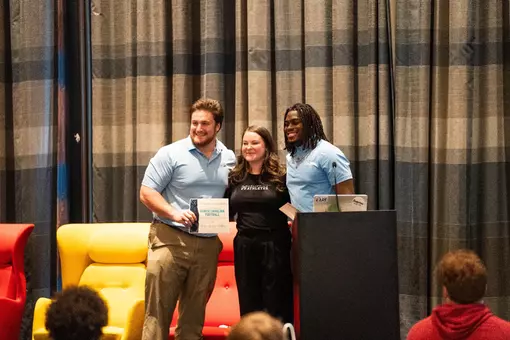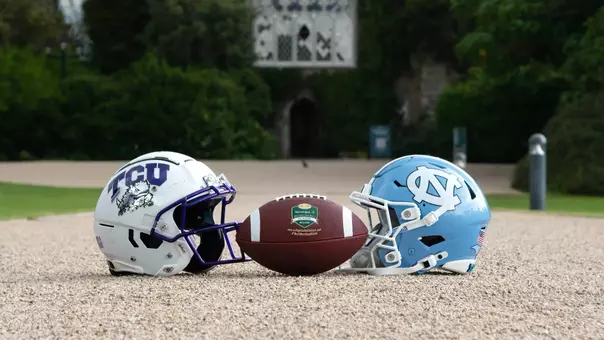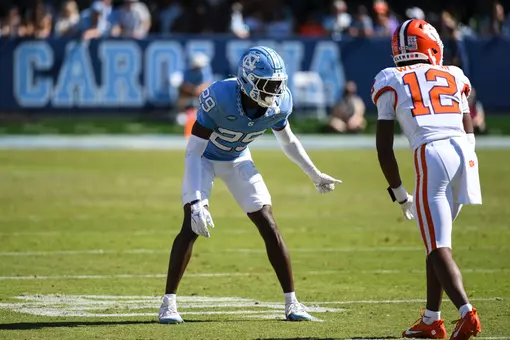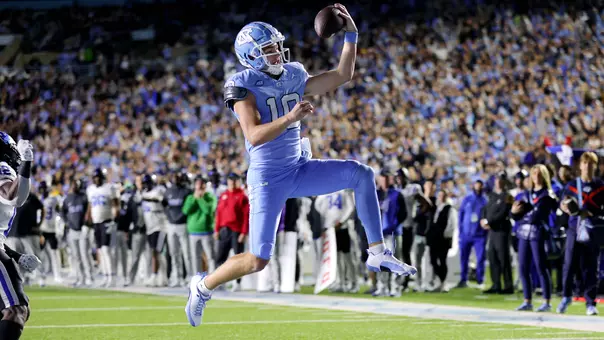University of North Carolina Athletics
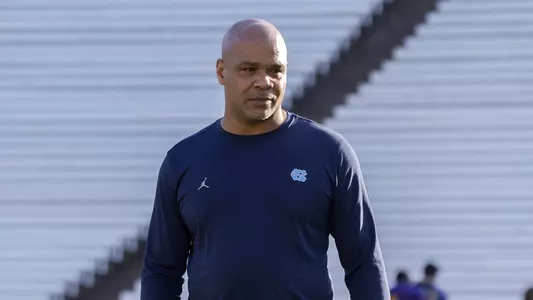
Photo by: UNC Athletic Communications
Five With Coach Thigpen
March 26, 2018 | Football
By Jeff Greenberg
Head coach Larry Fedora announced the hiring of Tommy Thigpen earlier this year. The former Tar Heel legend is excited to be back in Chapel Hill and the fans are excited that he's back in Carolina blue. We had a chance to catch up with Coach Thigpen and get his thoughts on joining Coach Fedora's staff.
1. What drew you home to North Carolina?
"I've been wanting to come home for a while. I left here in 2009 to work with Coach Chizik down at Auburn. Had a few chances during that time to come back to Carolina, but Coach Chizik had given me a great opportunity at Auburn and I felt a sense of loyalty there to him. I did the same thing with Coach Jones at Tennessee. When we got let go from Auburn, Butch hired me at Tennessee without ever even meeting me. There's something to be said for that. There's something about a guy to take a chance on you without working with you before. So since he took a chance like that on me I felt loyal to him in that situation as well. It's one of those things where Coach Fedora and I have always kept the channels of communication open and talked about opportunities at different times at Carolina. But the timing was never quite right and that's one thing that is important in this business is timing. I knew this time around when the opportunity came that I didn't want to go anywhere else. It was time to go home. It was time to be a part of getting this program to the heights we all want it to be."
2. What are some of the more significant differences between the Coach Thigpen that first started out in coaching, and the Coach Thigpen that is arriving this spring in Chapel Hill?
"I think I'm a lot more well-rounded as a complete coach than I was when I first started. People like to always say I'm a great recruiter, but I think I've developed past that description. I think my knowledge of the bigger picture has evolved. My knowledge of different defensive schemes and offensive schemes is more developed than when I first started coaching. Now when I walk into my room I'm able to teach them what we have to do at our position, but then why we're doing that and how that fits into the defense as a whole. The guys in my room respect my knowledge of the game, not because I can recruit, but because I know what I'm talking about schematically. And coaching in some of the games I have and being in the SEC, I feel like I've seen it all in this game. Nothing surprises me anymore and that helps me before games in preparing and during games in terms of making adjustments. Another area that I think I've gotten better at is how I relate to the players on the team and the guys in my room. I've learned to be more patient and have a bigger picture view of their lives here on campus as people. So I think I've grown as a coach, but also grown as a man or a leader for my guys."
3. Compared to when you played here, what changes do see in the program and what's your perspective on where it is now and where it can go?
"That's a great question and I'll tell you why. Football has evolved so much since I was a player. One thing for certain in this era of football is that it's really hard to stop guys. With the way the offenses have changed, it's just hard to go out and completely stop an offense. During my time in the SEC, one of the observations I made and one of things I took away was the fact that you really want to work for an offensive-minded head coach. Even if you're a defensive coach, you want the head man to be an offensive-minded guy. If you look at Coach Fedora's success on offense, you can't deny what he does. When we won our national championship at Auburn we were putting up points. I mean in this day and age if you can hold somebody to 28 points that's big. So you better be able to put up points. In coming here the difference is that when I watch our offense on tape, it's just really hard to scheme a way to stop them completely. They can plug people in and just run you up and down the field. They've got every RPO known to man and everything you do, Coach Fedora's offense has a counter for it. So that's part of why I'm here. I told myself that the next time I'm looking for a new opportunity; I want to go to a school where the head man is an offensive genius, because they get it. They know what needs to be done schematically. Even last year, I watched what they went through from an injury standpoint. That was a tough deal, but at least you know and can see, the scheme was right. The scheme was right. This is what you have to do in today's college football. And for a defensive guy like me, that means you'll be learning constantly how to get better because you're going up against this offense every day. Coach Fedora is the biggest difference in this program since I was here before. And that difference is the reason I came back."
4. Describe what it's like for a coach to learn to coach different position groups and how will it be different with the program now shifting to having two defensive backs' coaches.
It might have been different ten or twenty years ago, but coaches can't just know one position group in today's game. You have to have a working knowledge of every position on your side of the ball because of how complex everything has gotten to be now. You have to be able to coach your position but then coach your guys on why they're doing things a certain a way and the role their actions play in the unit as a whole. For instance, for me on defense, those back seven guys are so tied to each other now that we as coaches have to be dialed into the whole picture with the back seven. I feel like JP (Coach Papuchis) is on the cutting edge of where football is right now on defense in terms of mass communication between the back seven. They all have to be on the same page. It's not just see ball, hit ball football anymore. If you line up and try to do that against an offense like Coach Fedora's, they'll score 100 points on you. So I played linebacker, but I've coached safeties and corners before so I think that helps me understand the common threads of how and what these guys need to be communicating to one another in any given situation. I learned from a great guy in Ron Case, who was here with Dre Bly and those guys. I was trained as a DB coach. I look at it like a big jigsaw puzzle with those back seven guys. If you know how all seven of those pieces fit into the puzzle then you can help the team be successful as a coach and I'm excited to be a part of this defensive staff. I love coaching the backend also because your responsible for helping up front, but you're also responsible for not letting anything behind you. I like that challenge. I like that pressure. With everybody being able to throw the football now it's a pressure cooker every Saturday. I love it!"
5. What gets you up in the morning and get you excited about coaching football?
"You get the same feeling coaching that you did as a player. When a kid makes an interception or a big hit, you feel it too. It gets your juices going. When you see a kid grow from one season to the next because of the relationship you've built with him and the coaching you've provided, man that's a great feeling. You build relationships with them on the field and you build relationships with them off the field. There's nothing like it in another profession. One of my biggest enjoyments in this job is when guys are now coming up to me and telling me they want to do what I do. I've got some young guys coaching now and it's awesome because I got to see them grow as players and now they're growing as coaches. And that goes back to seeing them come on campus as eighteen year old kids and now they're growing up, coaching and starting families. That's what gets me up in the morning. There's nothing like it."
Head coach Larry Fedora announced the hiring of Tommy Thigpen earlier this year. The former Tar Heel legend is excited to be back in Chapel Hill and the fans are excited that he's back in Carolina blue. We had a chance to catch up with Coach Thigpen and get his thoughts on joining Coach Fedora's staff.
1. What drew you home to North Carolina?
"I've been wanting to come home for a while. I left here in 2009 to work with Coach Chizik down at Auburn. Had a few chances during that time to come back to Carolina, but Coach Chizik had given me a great opportunity at Auburn and I felt a sense of loyalty there to him. I did the same thing with Coach Jones at Tennessee. When we got let go from Auburn, Butch hired me at Tennessee without ever even meeting me. There's something to be said for that. There's something about a guy to take a chance on you without working with you before. So since he took a chance like that on me I felt loyal to him in that situation as well. It's one of those things where Coach Fedora and I have always kept the channels of communication open and talked about opportunities at different times at Carolina. But the timing was never quite right and that's one thing that is important in this business is timing. I knew this time around when the opportunity came that I didn't want to go anywhere else. It was time to go home. It was time to be a part of getting this program to the heights we all want it to be."
2. What are some of the more significant differences between the Coach Thigpen that first started out in coaching, and the Coach Thigpen that is arriving this spring in Chapel Hill?
"I think I'm a lot more well-rounded as a complete coach than I was when I first started. People like to always say I'm a great recruiter, but I think I've developed past that description. I think my knowledge of the bigger picture has evolved. My knowledge of different defensive schemes and offensive schemes is more developed than when I first started coaching. Now when I walk into my room I'm able to teach them what we have to do at our position, but then why we're doing that and how that fits into the defense as a whole. The guys in my room respect my knowledge of the game, not because I can recruit, but because I know what I'm talking about schematically. And coaching in some of the games I have and being in the SEC, I feel like I've seen it all in this game. Nothing surprises me anymore and that helps me before games in preparing and during games in terms of making adjustments. Another area that I think I've gotten better at is how I relate to the players on the team and the guys in my room. I've learned to be more patient and have a bigger picture view of their lives here on campus as people. So I think I've grown as a coach, but also grown as a man or a leader for my guys."
3. Compared to when you played here, what changes do see in the program and what's your perspective on where it is now and where it can go?
"That's a great question and I'll tell you why. Football has evolved so much since I was a player. One thing for certain in this era of football is that it's really hard to stop guys. With the way the offenses have changed, it's just hard to go out and completely stop an offense. During my time in the SEC, one of the observations I made and one of things I took away was the fact that you really want to work for an offensive-minded head coach. Even if you're a defensive coach, you want the head man to be an offensive-minded guy. If you look at Coach Fedora's success on offense, you can't deny what he does. When we won our national championship at Auburn we were putting up points. I mean in this day and age if you can hold somebody to 28 points that's big. So you better be able to put up points. In coming here the difference is that when I watch our offense on tape, it's just really hard to scheme a way to stop them completely. They can plug people in and just run you up and down the field. They've got every RPO known to man and everything you do, Coach Fedora's offense has a counter for it. So that's part of why I'm here. I told myself that the next time I'm looking for a new opportunity; I want to go to a school where the head man is an offensive genius, because they get it. They know what needs to be done schematically. Even last year, I watched what they went through from an injury standpoint. That was a tough deal, but at least you know and can see, the scheme was right. The scheme was right. This is what you have to do in today's college football. And for a defensive guy like me, that means you'll be learning constantly how to get better because you're going up against this offense every day. Coach Fedora is the biggest difference in this program since I was here before. And that difference is the reason I came back."
4. Describe what it's like for a coach to learn to coach different position groups and how will it be different with the program now shifting to having two defensive backs' coaches.
It might have been different ten or twenty years ago, but coaches can't just know one position group in today's game. You have to have a working knowledge of every position on your side of the ball because of how complex everything has gotten to be now. You have to be able to coach your position but then coach your guys on why they're doing things a certain a way and the role their actions play in the unit as a whole. For instance, for me on defense, those back seven guys are so tied to each other now that we as coaches have to be dialed into the whole picture with the back seven. I feel like JP (Coach Papuchis) is on the cutting edge of where football is right now on defense in terms of mass communication between the back seven. They all have to be on the same page. It's not just see ball, hit ball football anymore. If you line up and try to do that against an offense like Coach Fedora's, they'll score 100 points on you. So I played linebacker, but I've coached safeties and corners before so I think that helps me understand the common threads of how and what these guys need to be communicating to one another in any given situation. I learned from a great guy in Ron Case, who was here with Dre Bly and those guys. I was trained as a DB coach. I look at it like a big jigsaw puzzle with those back seven guys. If you know how all seven of those pieces fit into the puzzle then you can help the team be successful as a coach and I'm excited to be a part of this defensive staff. I love coaching the backend also because your responsible for helping up front, but you're also responsible for not letting anything behind you. I like that challenge. I like that pressure. With everybody being able to throw the football now it's a pressure cooker every Saturday. I love it!"
5. What gets you up in the morning and get you excited about coaching football?
"You get the same feeling coaching that you did as a player. When a kid makes an interception or a big hit, you feel it too. It gets your juices going. When you see a kid grow from one season to the next because of the relationship you've built with him and the coaching you've provided, man that's a great feeling. You build relationships with them on the field and you build relationships with them off the field. There's nothing like it in another profession. One of my biggest enjoyments in this job is when guys are now coming up to me and telling me they want to do what I do. I've got some young guys coaching now and it's awesome because I got to see them grow as players and now they're growing as coaches. And that goes back to seeing them come on campus as eighteen year old kids and now they're growing up, coaching and starting families. That's what gets me up in the morning. There's nothing like it."
UNC Softball: Tar Heels Stay Hot in Win vs Princeton, 5-2
Saturday, February 21
UNC Men's Basketball: Veesaar, Heels Rally Past Syracuse, 77-64
Saturday, February 21
UNC Gymnastics: Tar Heels Record Highest Score of Season at Cal
Saturday, February 21
UNC Softball: LeGette Walks-Off App State in Extras, 5-3
Saturday, February 21











